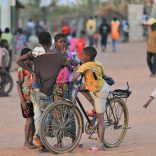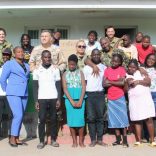Mozambique: Over 50% of confirmed mpox cases have recovered - health official
Thousands of albinos are at risk of life in Mozambique, says Amnesty International

File photo: Courtesy of APALBA
About 30,000 albinos are discriminated against and marginalised by Mozambican society Amnesty International’s annual report says, and the lives of many of them are at risk.
The authors of the document say that incidents of albino persecution increased during 2017, with at least 13 dead, and possibly more.
“The murders were motivated by superstition related to the magical powers of people with albinism, and most homicides occurred in the central and northern provinces, the country’s poorest regions,” they explain.
The report details how a seven-year-old albino boy was killed on January 31 last year in Ngauma district, Niassa province, by four unknown men who kidnapped him from his family’s home while he slept.
On May 28, a three-year-old boy was taken from his mother in the district of Angónia, Tete province.
On September 13, a 17-year-old boy was killed in the Benga area of Moatize district in Tete province, with the attackers, who removed his brain, hair and arm bones, never apprehended or tried.
“Despite the public outcry, the government does little to solve the problem. A strategy was designed to prevent such deaths, but it was not implemented, allegedly because of a lack of resources,” says the report.
The organisation also warns of the worsening food insecurity in the country, particularly in rural areas, where more than 60 percent of the population are affected by the acquisition by mining companies of land they used for subsistence farming and to source water.
In the Nhanchere area, in the Moatize district of Tete province, a coal mining company, Vale Moçambique started to fence off land used for grazing and collecting firewood in 2013, which provoked protests.
A peaceful demonstration on June 13, 2017 resulted in the death of Hussen António Laitone, shot dead by local police although he was not involved in the protest.
Violence was also used to intimidate critics of the authorities, such as Armando Nenane, who was beaten by police on May 17 in Maputo after being threatened with death by telephone.
“He was attacked for his opinions on the so-called G40, a group allegedly created during former president Armando Guebuza’s government to defame opponents,” Amnesty says, adding that no one has yet been held responsible.
Another case was former mayor of Nampula municipality Mahamudo Amurane, shot dead in front of his house on October 4, and whose killer remains to be found.
Amnesty also mentions that Amurane was in conflict with leadership of the Democratic Movement of Mozambique (MDM) and was preparing to leave the party and run for the re-election in the municipal elections of October of 2018.
Amnesty also reports a high rate of homicides of women, often by their own companions or relatives, on the grounds of witchcraft.
On January 10, a 31-year-old man stabbed his 27-year-old wife in Inhagoia neighbourhood on the outskirts of Maputo, and in February a 27-year-old man beheaded his mother in the Vanduzi district of Manica province because she allegedly refused to serve him food.
In May, a man killed his own mother in Guru district, Manica province for casting a sexual impotence spell on him, and in August, two brothers killed their 70-year-old grandmother in Messano, Bilene district, province of Gaza, because they thought she had cast a bad luck spell on them.
“Although the suspects have admitted that they committed the murders in all these cases, the authorities have failed to develop, programme or implement an effective strategy to combat violence against women,” the report says.
Amnesty International’s 2017-18 report, coinciding with the 70th anniversary of the Universal Declaration of Human Rights, covers 159 countries and offers a comprehensive analysis of the state of human rights worldwide.












Leave a Reply
Be the First to Comment!
You must be logged in to post a comment.
You must be logged in to post a comment.